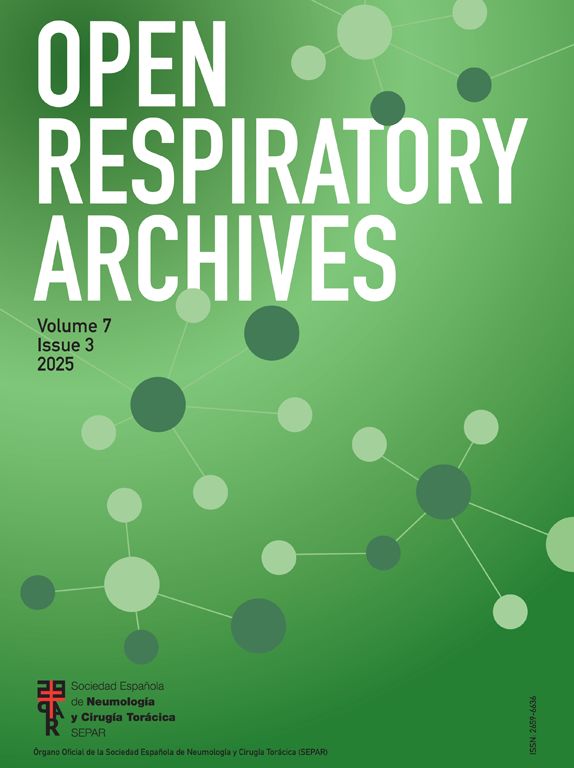In two months, from March 15 to May 15, 2020, coinciding with the Covid-19 pandemic, 10 patients were admitted to our Respiratory Medicine section due to COPD exacerbation. In the same period of the previous year, 46 patients were admitted with at least one COPD exacerbation.
This reduction in hospitalizations due to serious chronic processes appears to have occurred in other diseases as well. In this period, while the number of COVID suspected cases rapidly increased in the Emergency Department, non-COVID suspected patients dropped and remained well below the standard.1 These data are consistent with those described in international series in several diseases, with a notable decrease in patients admitted with stroke during this pandemic in Italy2 and with ischemic heart disease in China.3 It has been generally assumed that patients did not go to hospital for fear of contracting Covid-19, and consequently special measures have been proposed in emergency departments to encourage patients with symptoms other than those of SARS-CoV-2 infection to consult.1,4
If COPD patients have suffered severe exacerbations and, for fear of contagion, have avoided hospital treatment, it can have important clinical consequences. However, the symptoms of a severe exacerbation of COPD are not easy to tolerate and often require urgent medical intervention; it seems unlikely that patients would choose to avoid hospital care. There may also have been a variation in the clinical criteria for admission decisions in COPD patients, as has been observed in other diseases.5
With these considerations in mind, we wanted to approach what may have happened to our COPD patients during the SARS-CoV-2 pandemic. As a sample of patients with a higher risk of exacerbation, we analyzed a group composed of frequently exacerbated COPD patients (defined as those who had two or more severe exacerbations in the previous year6) who were hospitalized in our department in the 8 months prior to the pandemic.
Thirty-eight COPD frequent exacerbators phenotype patients were identified. Five patients who had died before the onset of the Covid-19 pandemic were excluded. The electronic medical records of the remaining 33 patients were reviewed, recording hospital admissions and their cause, emergency attendances and exacerbations treated at home. The patients analyzed were 29 men (88%) and 4 women. The age (mean±SD) was 72±11 years. They had previously presented an average of 3.5±1.3 exacerbations in the year and their BODEx index was 6±1.
Of these 33 patients, 26 (79%) did not suffer from COPD exacerbation (defined as an increase in symptoms requiring the prescription of systemic antibiotics and/or steroids) and 7 patients (21%) did. Of these 7, 2 were admitted to the hospital ward, 2 were treated in the emergency department and referred home and 3 were treated by their primary care physicians for worsening respiratory symptoms with resolution. Of the 26 COPD patients without exacerbation, one was admitted due to Covid-19 and two others required assistance for non-respiratory reasons (trauma and neurological symptoms).
The interpretation of our data suggests that COPD patients do not appear to have avoided going to hospital for severe exacerbations of their condition. The remarkable decrease in admissions (from 46 patients in the previous year to 10 during the pandemic) may have been due to an actual decrease in exacerbations. It is possible that in some cases the clinical worsening was not detected due to self-medication, but it is unlikely that these could be severe exacerbations.
Several causes could be suggested to explain the decrease in exacerbations and hospital admissions. On the one hand, social isolation has led to less exposure to respiratory pathogens. In addition, the absence of physical activities due to staying home could have prevented symptoms or made them more tolerable. Finally, the reduction in environmental pollution could also have had a significant effect.7 In our area (according to data available at http://www.cma.gva.es/cidam/emedio/atmosfera/jsp/historicos.jsp) average NO2 levels have decreased by more than 50% compared to the same period in 2019, O3 levels by 12% and PM10 levels by more than 30%. SO3 and CO values have been similar in both periods. A potential limitation of our study is that it corresponds to a single center with a relatively small number of patients. The experience of other hospitals could complement our findings.
In conclusion, we have observed a notable reduction in COPD admissions during the Covid-19 pandemic. However, in view of clinical course of patients with previous multiple exacerbations, it does not seem that patients avoided going to hospital for severe symptoms of the disease, and, consequently, there may have been a real decrease in exacerbations.
FundingNone.
Conflict of interestNone to declare.





